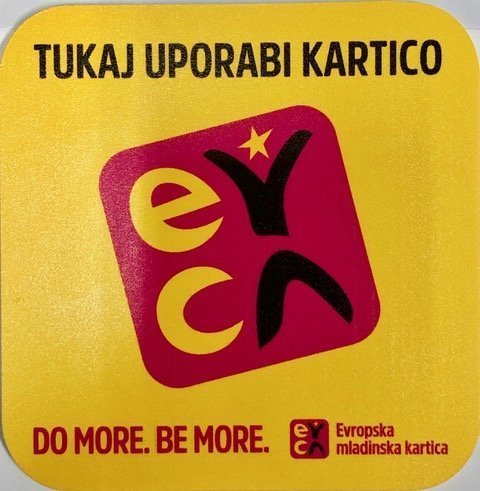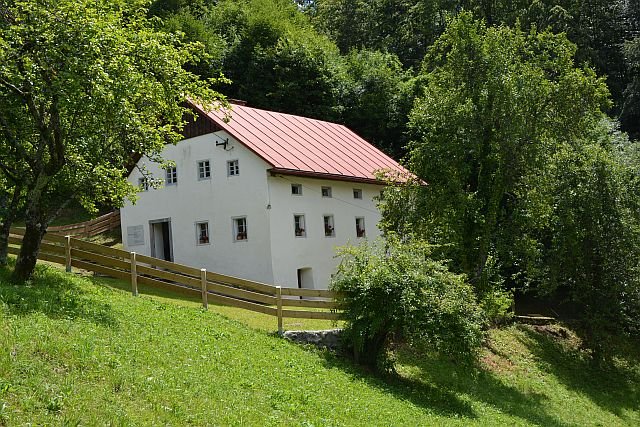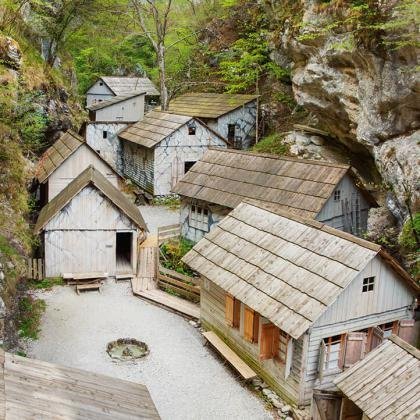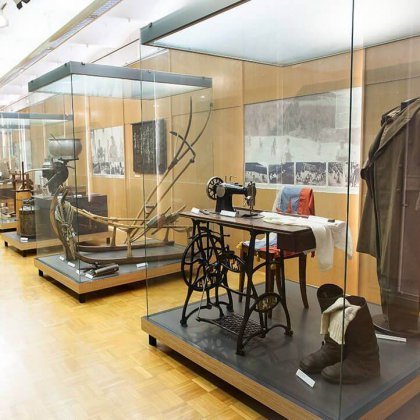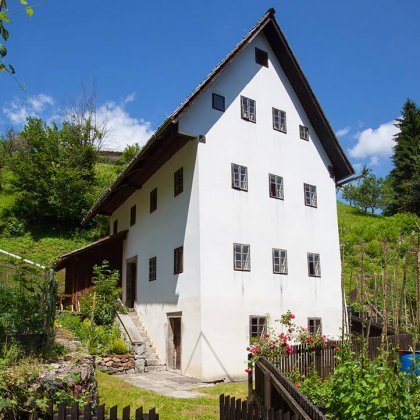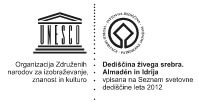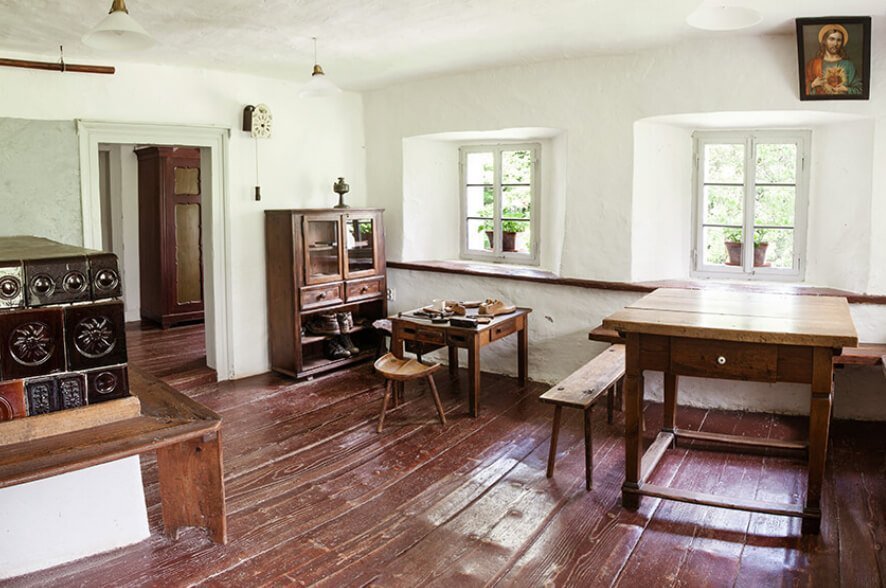
Volar Homestead in Zakojca
Zakojca, the birthplace of the writer France Bevk, is located on the northern slope of Mount Kojca rising above Baška grapa. It consists of three parts: The villages of Gorenja, Srednja and Dolenja vas. There used to be the writer’s birth house in Dolenja vas, his other home is still there where the family moved when France was about three years old. It’s not known when the house was built, his grandfather Jakob bought it at auction. He was a shoemaker and a herder of oxen, therefore their house was called Volar Homestead (at the ox herder’s). The Bevk family owned it until the end of the 1980s, when it was purchased and turned into a memorial museum. It was opened in September 1990 on the 100th anniversary of the writer’s birth.
Could the chimney be a special feature of the house?
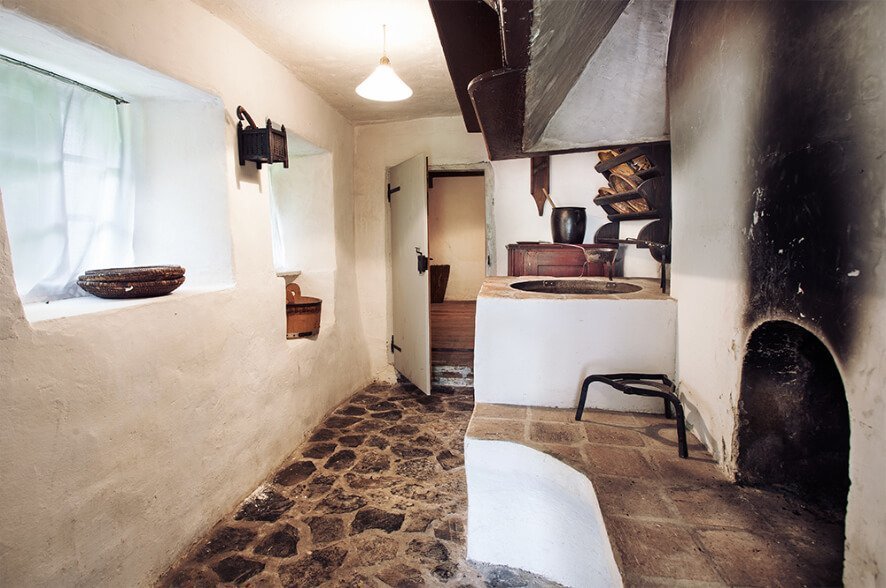
Although the Bevk family is considered a cottage as they didn’t have a lot of land, their rather spacious home didn’t look like a cottage at all. Built of stone and somewhat sprawling, the house leans into the slope and almost touches the ground on the upper side. As Bevk wrote in his memoirs, it used to be lower and had a thatched roof, which was replaced by sheet metal in the 1920s. The next three special features separated it from most of the other houses in the village. A thin wall separated the lobby and the kitchen. There was a chimney on the roof, a true rarity at that time. In most of the houses, the smoke from the black kitchen went through the door and outside. Instead of the usual ladder, steep wooden stairs led to the attic. There were two arched cellars and a stable in the bottom part. In the ground floor, the door led straight to the kitchen, leading on to the barn and to the right side into the house, the main living space, and then into a small and large den.
The Bevk family
The house was a little tight for the large family. Besides granddad Jakob, grandma Neža and aunt Justina, his parents lived here, Ivan and Katarina, their first-born France, and seven other brothers and sisters. Their humble fields didn’t allow survival, so the father and grandfather repaired shoes while mother and grandmother helped farmers in the village with various jobs. The children were also involved in everyday tasks from a very young age. Despite their humble lives, Bevk’s parents appreciated knowledge. Books had an important place in their lives. France discovered new worlds in them, and his imagination was sparked by the stories of his grandparents.
He was very affected by the premature death of his mother to whom he was very close. A year later, his father remarried and his second wife Marija gave him eight children.
France's path from a Zakojca little boy to a writer and politician
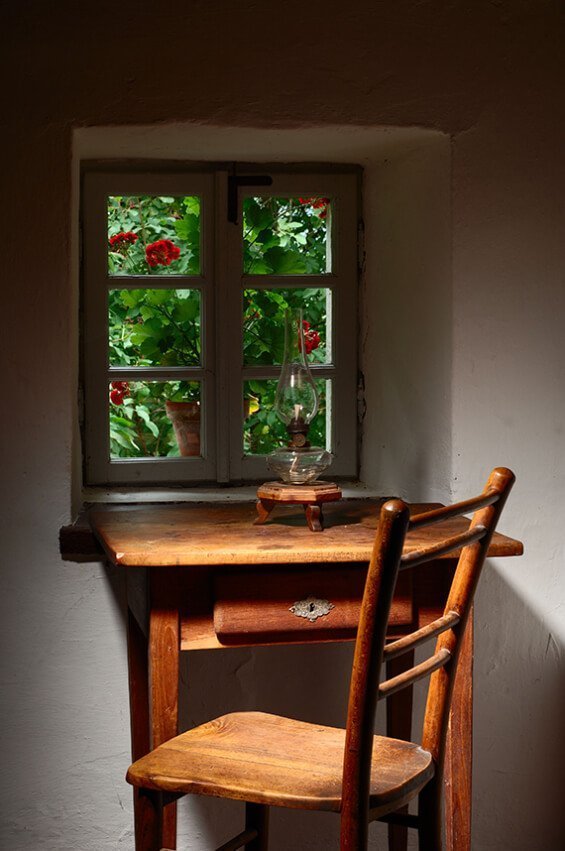
The future writer France Bevk was born on 17 September 1890. His early interest in books was also promoted by his teacher in the folk school in the Bukovo settlement, who brought him lots of books to read. He soon started to write his first publications — with the help of the dean Knavs — allowing him to go to teachers’ college. His teaching in domestic villages was interrupted by the First World War I. After the war, he was disappointed by the Italian occupation of Primorska region and moved to the capital of Ljubljana for a while, but returned to Gorica in 1920. He embarked on a path as an editor, writer and a persistent fighter for oppressed Slovenian language and culture under fascism. This is what he wrote about in his best novel titled Chaplain Martin Čedermac (Kaplan Martin Čedermac). Bevk ended up behind bars several times because of his work. He joined the partisans during the Second World War and was elected to some important political functions, wrote articles for partisan journals and was an editor of the Partisan Journal for about a month.
After the war, he was involved in the fight to restore the Primorska region to the motherland. He was a vice-president of the Slovenian government and a republican and federal parliament member. After retirement, he dedicated himself to writing again, mostly for young people. As Chairman of the Slovene Writers’ Association, he organised a number of literary evenings across Slovenia and also performed in the company of other writers. He often visited schools and a second reading report in Slovenia was named after him in 1963 – Bevk’s Reading Report. The campaign aimed at promoting reading among young people starts on 17 September each year on the anniversary of the author’s birth. This is also called a Golden Book Day, as Bevk believed that every good book is a golden book. France Bevk was also a regular member of the Slovenian Academy of Sciences and Arts (SASA): he received several awards and recognitions for his work, twice a Prešeren Award and Levstik Award. He lived in Nova Gorica and Ljubljana, where he died in 1970 on his 80th birthday. He is buried in Solkan. Bevk’s personal life was very colourful. He was married twice, and fathered many children through his marriage and intimate informal relationships; he took care of them all. His sons are the writer, playwright and publicist Vasja Ocvirk and the theatre director Marjan Bevk.
Bevk’s works
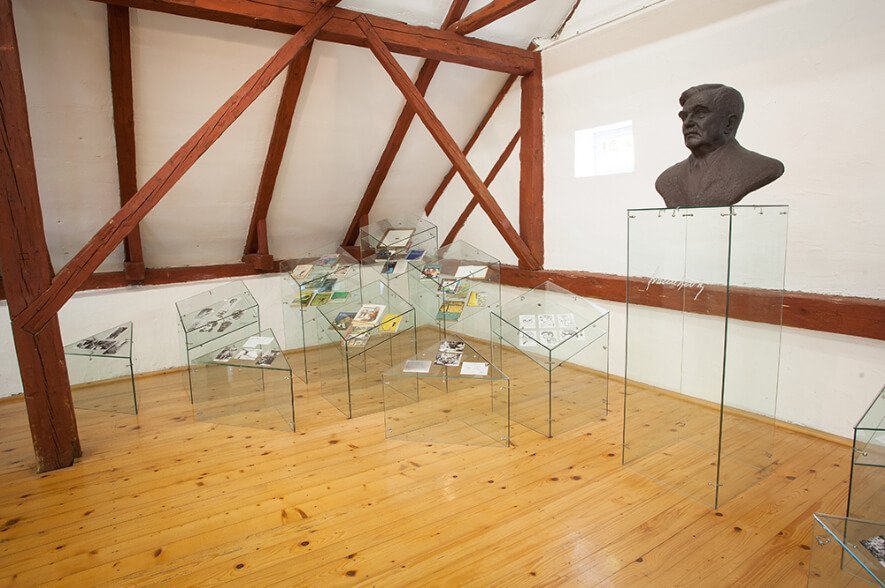
Bevk was an extremely prolific youth writer. He wrote about 50 works for the young people, and over 150 all together. He is also one of the most translated Slovenian authors. His works have been translated into more than twenty languages. Films and TV shows have been made based on some of his works (Chaplain Martin Čedermac, The Shepherds, The Mammy, Black Brothers).
- Peter Klepec, 1956
- Pacek in packa, 1957
- Spodobno se obnašaj, 1957
- Pisani svet, 1958
- Ob morju in Soči, 1959
- Razbojnik Saladin, 1959
- Smeh skozi solze, 1959
- Luna, 1960
- Mladost med gorami, 1960
- Ognjeni krst Gregca Petelinčka, 1960
- Lenuh poležuh, lutkovna igrica, 1961
- Pikapolonica, 1962
- Iz iskre požar, 1963
- Janko in Metka, 1963
- Otroci samote, 1963
- Učiteljica Breda, 1963
- Vanka partizanka, 1963
- Rož, Podjuna, Zila, potopis 1965
- Zgodba o Drejčku – Pikapolonica, 1965
- Naše živali, 1966
- Tolminski punt, 1968
- Zlata voda in druge zgodbe, 1969
- Pastirčki pri plesu in kresu, 1920
- Tatič, 1923
- Bedak Pavlek, otroške igre, 1925
- Jagoda, 1930
- Lukec in njegov škorec, 1931
- Lukec išče očeta, 1932
- Kozorog, 1933
- Tovariša, 1934
- Pastirci, 1935
- Začudene oči, 1936
- Čarovnica Čirimbara, 1938
- Lepo vedenje, 1938
- Grivarjevi otroci, 1939
- Pestrna, 1939
- Plešimož, 1939
- Legende, 1939
- Tonček, 1948
- Otroška leta, 1949
- Mali upornik, 1951
- Črni bratje, 1952
- Obnašaj se spodobno, 1953
- Knjiga o Titu, 1955
- Pazi na glavo – glava ni žoga, 1955
- Gmajna, 1933
- Veliki Tomaž, povest, 1933
- Živa groza in drugi spisi, 1933
- Ljudje pod Osojnikom, 1934
- Srebrniki, 1934
- Bridka ljubezen in drugi spisi, 1935
- Mrtvi se vračajo, 1935
- Samote, tri povesti, 1935
- Izlet na Špansko, potopis, 1936
- V mestu gorijo luči, 1936
- Človek proti človeku, 1937
- Ubogi zlodej, 1937
- Bajtar Mihale in drugi spisi, 1938
- Deset dni v Bolgariji, potopis, 1938
- Kaplan Martin Čedermac, 1938
- Stražni ognji, 1938
- Dan se je nagibal, novele, 1939
- Huda ura, 1939
- Pravica do življenja, 1939
- Mlada njiva, novele, 1940
- Med dvema vojnama, novele in črtice, 1946
- Morje luči, 1947
- Mati, 1949
- Obračun, 1950
- Še bo kdaj pomlad, scenarij, 1950
- Pot v svobodo, 1953
- Tuja kri, povest, 1954
- Črna srajca, roman, 1955
- Iskra pod pepelom, zgodovinska povest, 1956
- Mrak za rešetkami, spomini, 1958
- Viharnik, povest, 1959
- Brez krinke, 1960
- Domačija, povest, 1960
- Slepa ulica, 1961
- Mlini življenja, 1967
- Pot v neznano, 1970
- Pesmi, 1921
- Faraon, 1922
- Rablji, 1923
- Kajn, drama, 1925
- Smrt pred hišo, roman, 1925
- Brat Frančišek, 1926
- Hiša v strugi, 1927
- Jakec in njegova ljubezen, 1927
- Kresna noč, 1927
- Krvavi jezdeci, Znamenja na nebu, 1. knjiga, 1927
- Vihar, 1928
- Zastava v vetru, 1928
- Škorpijoni zemlje, Znamenja na nebu, 2. knjiga, 1929
- Črni bratje in sestre, Znamenja na nebu, 3. knjiga, 1929
- Krivda, povest, 1929
- Muka gospé Vere, 1929
- Sestra in drugi spisi, 1929
- Tuje dete in drugi spisi, 1929
- V zablodah, roman,1929
- Človek proti človeku, 1930
- Gospodična Irma, 1930
- Julijan Sever, 1930
- Nagrada in drugi spisi, 1930
- Umirajoči bog Triglav, 1930
- Živi mrlič in drugi spisi, 1930
- Burkež gospoda Viterga, 1931
- In solnce je obstalo, 1931
- Kamnarjev Jurij, 1931
- Predporočna noč in drugi spisi, 1931
- Stražni ognji, povest, 1931
- Vedomec, roman, 1931
- Slepec je videl in drugi spisi, 1932
- Železna kača, roman, 1932
- Žerjavi, 1932
- Dedič, 1933
Programmes for adult groups
Homestead of the writer France Bevk in Zakojca
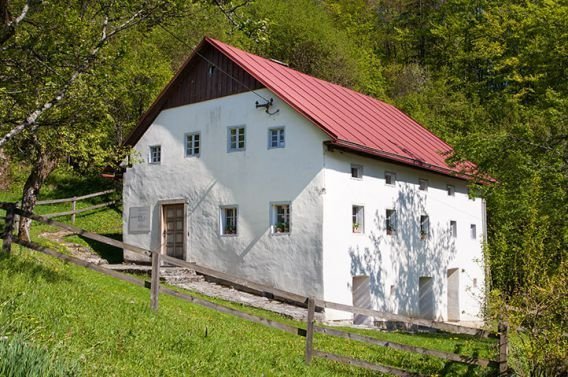
A well-known Slovenian writer France Bevk, among other things the author of Pastirci (Shepherds), spent his childhood and his adolescent years at the Volar Homestead in Zakojca above Baška grapa. He wrote his first book in the attic at the age of 12, later describing his home in numerous novels and short stories. The Memorial Museum is a place where there still are the Pastirci, Pesterna and the Grivarjevi otroci!
School programmes
Homestead of the writer France Bevk in Zakojca
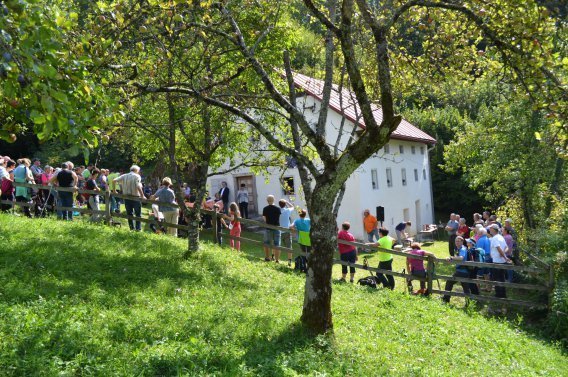
Opening hours
Homestead of the writer France Bevk
Tour:
Special features
Zakojca is located on the northern slope of the 1,303m high Mount Kojca. It is accessible from the Bača Valley (Grahovo, Hudajužna) or from the Idrijca river valley (Reka). A shorter and steeper road takes you from the Cerkno direction, from Reka over Bukovo, and the longer road through Cerkno and its picturesque villages. The guide who takes you around the homestead is the guide from Pri Flandru in Zakojca or from the Cerkno Museum, so advance announcement is mandatory for the groups, and desired for individuals. The carpark is at the centre of the village next to the tourist farm and is about a 15-minute walk away.
